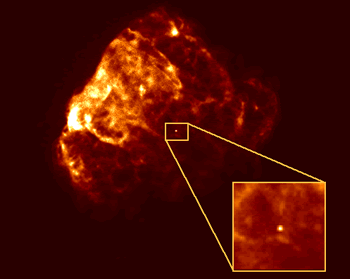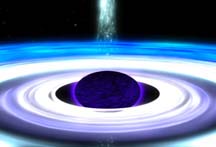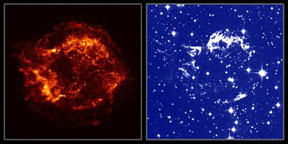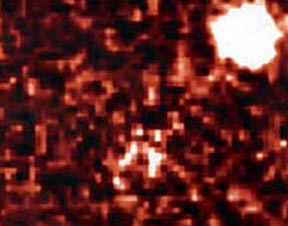Click on image for full size
L. Ferrarese (Johns Hopkins University) and NASA.
Related links:
Einstein's Messengers - LIGO Documentary - streaming RealVideo (20 min. 12 sec.) from NSF
Movie of matter falling into a black hole (artist's concept) (3.6 Mb!)
Black Holes
Black Holes are theoretical objects in the Universe which, by their very nature, are almost impossible to directly detect. A black hole is an object which has so much mass and such a high density that nothing, not even light, can escape its gravitational clutches. Hence it is black.Black Holes may form as the result of the collapse of a very massive star at its death. Just as neutron stars form during a supernova explosion of a very massive star so do black holes. But in the black hole case the initial star was so massive that not even the quantum mechanical pressures that keep neutrons from collapsing can halt the force of gravity's pull. All the matter of the star's core is crushed to an infinitely small point, a singularity.
A black hole is shielded from the outside world by what is called an event horizon. This is a sphere around the black hole where the escape velocity is the speed of light. Interior to this horizon the escape velocity is greater than light, and since nothing may move faster than light everything that crosses the event horizon is gone forever.
Despite the blackness of black holes there has been evidence of their existence. If a black hole forms near a star it may pull matter from that star's surface off. The matter spirals toward the black hole in an accretion disc. This accretion disc will emit X-rays. Such X-ray sources have been detected and some show evidence that the object accreting the matter is so massive that it must be a Black Hole. Other such methods have led some to believe that many if not most galaxies harbor supermassive black holes in their cores. These black holes have gobbled so much matter that they have the mass of billions of suns.
What would it be like to enter a black hole? None too pleasant. First, as you approach the black hole the difference in the gravitaional pull on your head compared to your feet (known as tidal forces) would literally rip you apart. But suppose you survived that. Once you cross the event horizon there is no turning back and the only thing to do is avoid the black hole itself at all costs. If you run into that singularity it will crush every atom, every proton, neutron, electron, quark, etc. of your body right out of existence.
Interestingly, if people from Earth were observing your decent into a black hole they would never see you cross the event horizon. Albert Einstein's theory of General Relativity says that as you approach a black hole your time slows down. The closer you get to the black hole the more you appear to be in slow motion as seen by Earth observers very far away. Eventually you appear to be frozen in time as you cross the event horizon. Of course, you notice nothing different whatsoever. But if you were to suddenly change your mind right before crossing the event horizon and return to Earth you would find it in the very distant future. You've become a time traveler! Neat huh?
![]() Einstein's Messengers - LIGO Documentary - streaming
RealVideo (20 min. 12 sec.) from NSF
Einstein's Messengers - LIGO Documentary - streaming
RealVideo (20 min. 12 sec.) from NSF
 Movie of matter falling into a black hole (artist's concept) (3.6 Mb!)
Movie of matter falling into a black hole (artist's concept) (3.6 Mb!)















